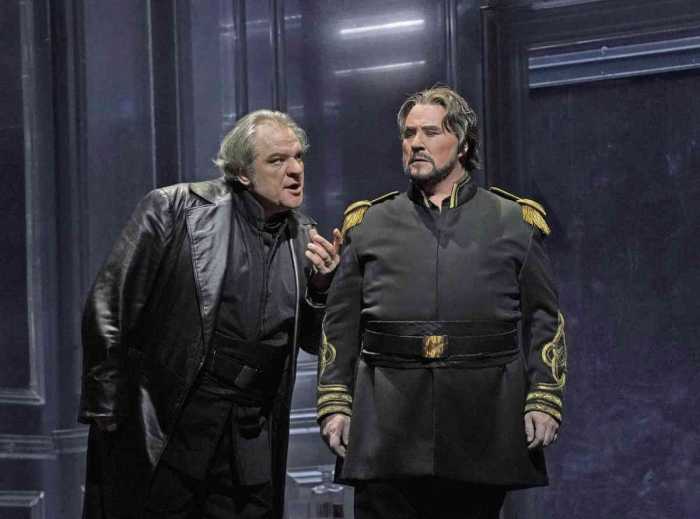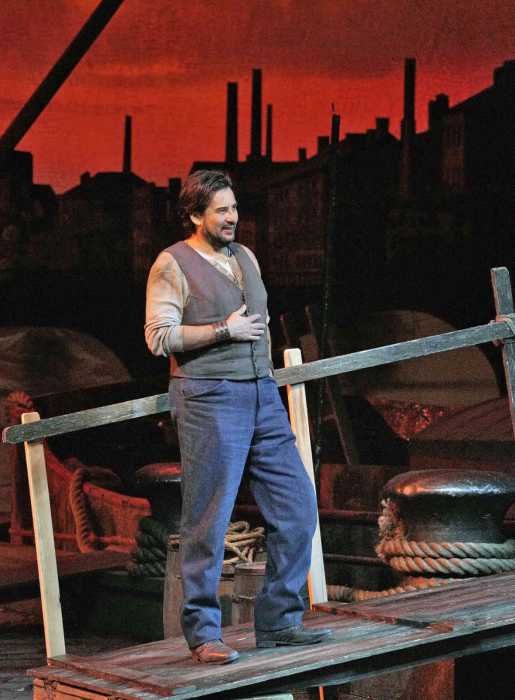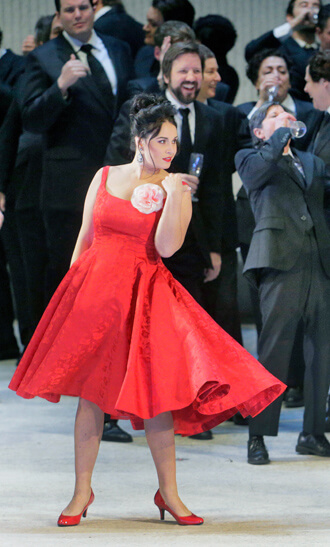Clementine Margaine and Ferruccio Furlanetto in the Lyric Opera of Chicago production of Massenet’s “Don Quichotte.” | TODD ROSENBERG
BY DAVID SHENGOLD | Washington National Opera had two aces in the hole for its staging of “La fille du régiment,” heard November 18 – redeeming what was otherwise problematic. The production was by a “director and choreographer” — always a red flag in my experience if you’re not dealing with an opera-ballet – Robert Longbottom. So the continual motion and coy posing and flailing soldiers with identical gestures did not surprise – they just disappointed. When will companies learn that Donizetti’s opera comique is a comedy of sentiment, not an excuse for cheap shenanigans and frippery? Visually, this performance only exceeded that provincial level in James Noone’s genuinely elegant Act Two set.
Kevin Burdette (Sulpice) – no bel canto singer, to put it mildly – remains a gifted physical comedian willing to do anything to steal focus. Deborah Nansteel, a good mezzo whose career WNO has wisely advanced, had neither the comedic chops nor the command of French to effectively play the Marquise. Christopher Allen conducted decently, but the choral ensemble and string tone were not what they should have been at the run’s sixth show.
Operatic riches in Washington and Chicago
None of this particularly mattered because the two stars, Lisette Oropesa (Marie) and Lawrence Brownlee (Tonio), offered world-class bel canto performances that were utterly delightful. (We briefly heard a third outstanding voice in Hunter Enoch’s Corporal.) Brownlee had sung his part — tackling with equal élan the famous nine-high-C first aria and the line-centered second one, with C sharp thrown in — at the Met in 2011-12. If anything he was even more charming and confident in enacting it here. Oropesa proved an ideal Marie in wedding excellent technique – trills, staccato, and runs for days — to unforced charm and excellent Gallic style. Though funny, she and Brownlee didn’t mug or ironize their way through their roles but played them for emotional truth: just what the piece needs, and the audience loved them both. Neither of these great, popular American singers appears at the Met this season – which I find shameful.
Two nights later, DC operagoers heard a less mainstream French score, Massenet’s “Hérodiade,” at Washington Concert Opera, held at Lisner Auditorium. It’s the original “highlights” opera, with several stirring arias and ensembles linked by familiar generic musical gestures – some creditable, some claptrap. It was good to hear it once, in Antony Walker’s generally strong reading. Here, too, however, the chorus lacked precision, though the many instrumental solos were well taken.
Replacing Michaela Martens, rising dramatic mezzo Dana Beth Miller summoned up some diva power in the title role, perhaps pushing too hard at register extremes to make an impression (I flashed on Nell Rankin). Given the circumstances, Miller made a strong showing. Two internationally rising artists reinforced their star presence and vocal gifts. Joyce El-Khoury (Salome) demonstrated excellent sung French and real vocal acumen. Her still-growing voice has some uneven and overdarkened places, but she manages to avoid accidents through an oft-applied diminuendo.
Michael Fabiano’s Jean showed consistently beautiful tone and welcome dynamic variety; a friendly crowd received the tenor’s impassioned showing worshipfully. To me, there’s room for improvement in terms of French style, including not “taking vacations” on top fortes. Ricardo Rivera — compensating for lack of power by constant arm gestures — wasn’t in the same league interpretively or vocally as Herode, but the two subleads, bass Wei Wu (the astrologer Phanuel) and baritone Aleksey Bogdanov (the Roman leader Vitellius), really stood out for vocal size and quality. A fun evening.
WCO’s next outing is Beethoven’s “Leonore” (March 5) with Marjorie Owens, Simon O’Neill, and Alan Held.
The Chicago Symphony’s beautiful home hosted an all-Handel evening December 2 with specialist Nicholas Kraemer leading small but choice instrumental forces and — in that context — the fine but perhaps too massive CSO Chorus. The opening Coronation Anthem “Zadok the Priest,” a piece that revs from zero to 60 in 90 seconds, impressed with dynamic contrast and the excellence of the trumpeters. Choral ensemble was crackerjack in runs, less so on sustained notes.
The terrific Boston-based baroque soprano Amanda Forsythe — whom insular New York audiences have yet to “discover” — proved a terrific soloist in the early Psalm setting “Laudate pueri Dominum” and the motet “Silete venti.” Intelligently projecting a springwater-clear instrument a shade small for this venue, Forsythe showed remarkable stylistic and technical mastery over her material — most memorably in the motet’s second aria’s notoriously testing “B” section, taken at top speed by Kraemer. Her singing – and the wonderful oboes – delighted the crowd.
Lyric Opera of Chicago mounted San Diego’s fine, traditional yet thoughtful staging by Matthew Ozawa of Massenet’s 1910 “Don Quichotte,” a fine vehicle for a mature bass star who can act and inflect French words. LOC had that many times over in Ferruccio Furlanetto, who gave a splendid, moving and nuanced performance. Massenet wrote the part for the iconic Feodor Chaliapin, a flamboyant actor, but he much preferred the subtle, word-based Vanni Marcoux. The singer of Quichotte has to project almost a Messianic quality of goodness and self-belief, and dynamic variety abounds. Furlanetto found the right tone and stance. New York deserves to see him in this role (as well as in Chaliapin’s career-defining part, Boris Godunov). Ozawa’s colorful staging, framed by devices underlining the role of imagination in the central character’s story, would serve that purpose just fine.
So would engaging LOC’s other two principals, Clementine Margaine’s Dulcinée and Nicola Alaimo, physically and vocally a born Sancho Panza. Indeed the French mezzo made more of her part than I have seen done before, with credible melancholy alternating with the courtesan’s spirited self-mocking. She wields chest tones with aplomb. Margaine comes to the Met as Carmen February 3-18 and should be worth catching as that somewhat kindred spirit.
One of Massenet’s clever devices in this score is to have Dulcinée’s admirers — probably all cast-off lovers — function as a quartet (soprano, mezzo, tenor, tenor). The company’s Young Artists did their bits well, with Diana Newman’s luminous soprano as the chief ear-catcher. Bradley Smoak’s Bandit Chief had taken the trouble to polish his spoken French.
Andrew Davis led a generous, lively performance; those onstage seemed to be enjoying themselves as much as the audience.
David Shengold (shengold@yahoo.com) writes about opera for many venues.



































